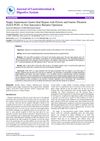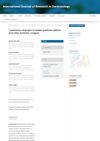 March 2024 in “Bioscientia medicina”
March 2024 in “Bioscientia medicina” The rs6152 allele is not a good marker for baldness in the Indonesian population, but family history, age, gender, high blood pressure, and body weight are linked to the risk.
Women with PCOS have different body composition and some metabolic differences compared to healthy women.
June 2021 in “Egyptian Journal of Dermatology and Venereology” Psoriasis, acne, and hair loss are linked to unhealthy cholesterol levels, increasing heart disease risk.
 September 2015 in “Journal of Steroids & Hormonal Science”
September 2015 in “Journal of Steroids & Hormonal Science” Inositol and folic acid treatment significantly reduced hair loss and other symptoms in patients with androgenetic alopecia, but more research is needed for confirmation.
 July 2015 in “Egyptian Journal of Dermatology and Venereology”
July 2015 in “Egyptian Journal of Dermatology and Venereology” People with androgenetic alopecia, both men and women, are more likely to develop heart diseases in the future.
 11 citations,
August 2014 in “PubMed”
11 citations,
August 2014 in “PubMed” Women with acne often have higher levels of male hormones and are more likely to be overweight, both of which can make acne worse.
 2 citations,
September 2014 in “Journal of evolution of medical and dental sciences”
2 citations,
September 2014 in “Journal of evolution of medical and dental sciences” Evaluating various physical and health factors helps diagnose polycystic ovarian syndrome (PCOS).
 October 2017 in “Journal of medical science and clinical research”
October 2017 in “Journal of medical science and clinical research” Obese people are more likely to have certain skin conditions like dark patches, stretch marks, skin tags, and bumpy skin.
 September 2019 in “Journal of evolution of medical and dental sciences”
September 2019 in “Journal of evolution of medical and dental sciences” Obesity significantly affects skin health, causing conditions like acanthosis nigricans and skin tags, and should be considered during skin exams.
 75 citations,
July 2013 in “The Journal of Clinical Endocrinology and Metabolism”
75 citations,
July 2013 in “The Journal of Clinical Endocrinology and Metabolism” Taking low-dose spironolactone and metformin together works better for PCOS symptoms than either drug alone.
 45 citations,
February 2011 in “Journal of the European Academy of Dermatology and Venereology”
45 citations,
February 2011 in “Journal of the European Academy of Dermatology and Venereology” People with lichen planus have higher bad cholesterol and lower good cholesterol, increasing their risk for heart disease.
 19 citations,
January 2017 in “Hormone Molecular Biology and Clinical Investigation”
19 citations,
January 2017 in “Hormone Molecular Biology and Clinical Investigation” High levels of male hormones are very common in women with PCOS and affect their metabolism differently depending on their weight.
 February 2020 in “Research Square (Research Square)”
February 2020 in “Research Square (Research Square)” Skin tags in obese individuals may indicate a higher risk of heart disease and diabetes.
 September 2018 in “Fertility and Sterility”
September 2018 in “Fertility and Sterility” African American women have a higher risk of preterm delivery than Caucasian women, and inflammatory stimuli affect gene expression in cells related to PCOS, showing a heightened inflammatory state in women with PCOS.
 68 citations,
April 2002 in “Journal of Human Nutrition and Dietetics”
68 citations,
April 2002 in “Journal of Human Nutrition and Dietetics” The intensive conventional diet with exercise led to better long-term weight loss and health improvements than the very low calorie diet in obese type 2 diabetics.
 14 citations,
August 2014 in “Applied Physiology, Nutrition, and Metabolism”
14 citations,
August 2014 in “Applied Physiology, Nutrition, and Metabolism” A low-starch/low-dairy diet may help overweight women with PCOS lose weight and improve metabolism, but more research is needed.
 13 citations,
April 2015 in “Human Reproduction”
13 citations,
April 2015 in “Human Reproduction” Obese Hispanic women with PCOS are at higher risk for metabolic problems than non-Hispanic white women.
 9 citations,
February 2022 in “Genes”
9 citations,
February 2022 in “Genes” Women with PCOS have more Bifidobacterium in their gut compared to those without PCOS.
 1 citations,
June 2023 in “Nutrients”
1 citations,
June 2023 in “Nutrients” Vitamin D deficiency is linked to a higher chance of metabolic syndrome in women with PCOS.
 1 citations,
January 2016 in “Journal of gastrointestinal & digestive system”
1 citations,
January 2016 in “Journal of gastrointestinal & digestive system” The new bariatric surgery SAGI PGP is effective for weight loss and diabetes control with few complications.
 June 2023 in “International Journal of Research in Dermatology”
June 2023 in “International Journal of Research in Dermatology” Weight loss from bariatric surgery improved certain skin conditions.
 June 2022 in “Biomedical reports”
June 2022 in “Biomedical reports” STK11 gene variations do not predict how well metformin will work for PCOS, but may affect hair loss and excess hair growth.
 February 2020 in “Diabetologie Und Stoffwechsel”
February 2020 in “Diabetologie Und Stoffwechsel” The document concludes that more research is needed to include new treatments in guidelines for Polycystic Ovary Syndrome (PCOS).
 March 2013 in “Endocrine Abstracts”
March 2013 in “Endocrine Abstracts” Ethnicity affects how polycystic ovary syndrome shows up in women, with white women having higher metabolic risks but less diabetes, and South Asian women showing more androgenic symptoms and being younger at presentation.
 491 citations,
July 2000 in “The Journal of Clinical Endocrinology and Metabolism”
491 citations,
July 2000 in “The Journal of Clinical Endocrinology and Metabolism” Polycystic ovary syndrome is found in 6.5% of unselected Caucasian women in Spain.
 48 citations,
September 2009 in “Dermato-endocrinology”
48 citations,
September 2009 in “Dermato-endocrinology” Anorexia nervosa can cause skin problems, which may help with early diagnosis and usually improve with treatment.
 46 citations,
August 2016 in “Journal of The American Academy of Dermatology”
46 citations,
August 2016 in “Journal of The American Academy of Dermatology” The study found that family history, personal history of adolescent acne, no pregnancies, hirsutism, office work, stress, and low intake of fruits/vegetables and fish are risk factors for adult female acne.
 42 citations,
August 2017 in “Human Reproduction”
42 citations,
August 2017 in “Human Reproduction” Women with polycystic ovary syndrome tend to have a longer distance between the clitoris and anus.
 41 citations,
September 2014 in “Journal of Pharmacy and Pharmacology”
41 citations,
September 2014 in “Journal of Pharmacy and Pharmacology” Melatonin may help treat PCOS symptoms in rats.
 35 citations,
May 2015 in “Arquivos De Gastroenterologia”
35 citations,
May 2015 in “Arquivos De Gastroenterologia” Women with PCOS are more likely to have fatty liver disease and worse metabolic health.



























